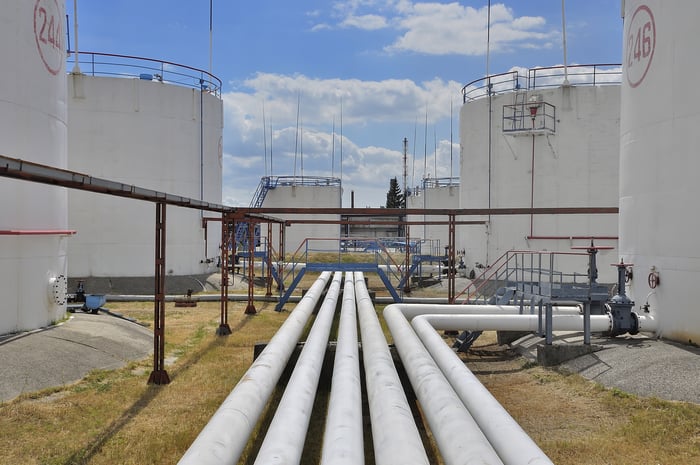Ready or not, here comes inflation. While it's unknown if rapidly rising prices for goods and services will be temporary or sustainable, it's pretty hard to overlook how quickly some items are increasing in cost.
According to the U.S. Bureau of Labor Statistics, trailing 12-month unadjusted energy costs (ended Sept. 30, 2021) rose by nearly 25%, with used car and truck prices up more than 24%, based on changes in the Consumer Price Index for All Urban Consumers (CPI-U). Other key items, such as food and shelter, were up 4.6% and 3.2%, respectively.
The price increases we've been witnessing in the CPI-U represent roughly a 13-year high (5.4% for all items). In other words, if you have cash sitting on the sidelines, inflation is quickly whittling away at your buying power.

Image source: Getty Images.
Arguably the best way to tackle rapidly rising inflation is to set up a portfolio of safe, yet effective, inflation-crushing high-yield dividend stocks. Companies that pay a dividend are often profitable on a recurring basis, and they're time-tested -- i.e., they've successfully navigated their way through previous economic downturns.
The biggest dilemma for income investors is simply picking out which dividend stocks to buy. That's because high-yield dividend stocks (4% or higher yield) come with added risks. Since yield is a function of payout relative to share price, a struggling business with a falling share price could be nothing more than yield trap for investors.
But that's not the case with the following five high-yield dividend stocks. These companies sport an average yield of nearly 8.5% and can collectively help investors safely and easily outpace the prevailing inflation rate.

Image source: Getty Images.
Annaly Capital Management (10.13% yield) and AGNC Investment Corp. (8.72% yield)
The first ultra-high-yielding stocks income investors can confidently add to their portfolio to trounce inflation are Annaly Capital Management (NLY 1.02%) and AGNC Investment Corp. (AGNC 0.97%). I've placed these two companies together because they're both mortgage real estate investment trusts (REITs) that operate very similarly.
Mortgage REITs like Annaly and AGNC pay very close attention to interest rates. That's because they borrow money at lower short-term rates and use this capital to acquire higher-yielding long-term assets, such as mortgage-backed securities (MBS). The wider the gap between the average yield on MBSs minus the average borrowing rate -- this gap is known as the net interest margin -- the more profitable these companies can be.
The interesting thing about mortgage REITs is they usually perform their best during the early years of an economic recovery. That's because the steepening of the yield curve typically observed during a bounce back from a recession helps to expand the net interest margin for Annaly and AGNC.
Additionally, Annaly and AGNC almost exclusively purchase agency securities. An agency asset is backed by the federal government in the event of a default. As you can imagine, this added protection does weigh down the yields these companies can expect to receive from the MBSs they buy. However, it also allows them to use leverage to maximize their profit potential.
Historically, Annaly has averaged a 10% yield over the past two decades, while AGNC has averaged a double-digit yield for 11 of the past 12 years. They're both good bets to help income investors outpace inflation.

Image source: Getty Images.
Mobile TeleSystems (10.83% yield)
Crushing inflation is also easy to do when you own a stake in a company parsing out a nearly 11% yield! Russian telecom stock Mobile TeleSystems (MBT), better known as MTS, doesn't have a set dividend, but the company has averaged in the neighborhood of 10% for its annual yield over the past six years.
The biggest catalyst over the next half-decade for MTS is the steady rollout of 5G wireless infrastructure. It's been about a decade since the last major upgrade to wireless download speeds, and Russian telco's have a lot of extra square miles to cover to reach domestic suburbs and rural communities. This ongoing 5G rollout should encourage device upgrades and lift operating results for the company's steady wireless segment.
Then again, wireless growth tends to be modest, at best. With wireless saturation rates already high in Russia, MTS has begun turning to new verticals as a means to boost growth.
For example, the company's new revenue channels include MTS Bank, cloud services, and a paid TV segment. This non-core revenue grew 27% in the June-ended quarter from the prior-year period, with a growing number of people choosing more than one MTS service. In particular, cloud and digital solutions revenue grew 48% year-over-year, while over-the-top media subscribers grew by well over 100% to 3.2 million.
Once again, Mobile TeleSystems' payout will change from year to the next. But taking into account the momentum in its core and ancillary operations, a payout of around 10% may well be sustainable.

Image source: Getty Images.
Philip Morris International (5.2% yield)
The days of high-growth tobacco stocks are long gone. But even with the headwinds this industry has faced, giants like Philip Morris International (PM -1.11%) continue to deliver.
The first thing to understand about tobacco products is their pricing power. Even though adult smoking rates have declined in a number of developed markets as the dangers of long-term tobacco use have come to light, Philip Morris hasn't felt the pinch you'd expect. That's because a downdraft in cigarette shipments can be partially or fully offset with price hikes. Philip Morris is the company behind the premium Marlboro brand in markets outside the U.S., and it's had no issues passing along higher prices on its core brand to lift sales.
Geographic diversity is another big selling point for Philip Morris International. As its full company name implies, it has a presence in over 180 markets worldwide. This means it can offset tougher regulations in developed countries with strong organic growth potential from burgeoning middle classes in emerging markets.
And don't overlook the company's push beyond traditional tobacco products. Philip Morris' IQOS heated tobacco system is growing like wildfire, albeit it's still in the early stages of global expansion. Through the first nine months of 2021, almost 70 billion heated tobacco units were shipped, marking a 28% increase from the prior-year period.
Philip Morris' 5.2% yield may be the low-water point on this list, but it's a rock-solid payout.

Image source: Getty Images.
Enterprise Products Partners (7.42% yield)
A final safe, high-yielding stock that can help investors crush inflation is master limited partnership Enterprise Products Partners (EPD 0.45%). Enterprise Products is paying out a hearty 7.4% and is riding a 22-year streak of increasing its base annual dividend.
In general, oil stocks probably don't rank too highly with income investors following the historic demand drawdown crude oil experienced during the coronavirus pandemic. A number of upstream producers (i.e., drillers and explorers) were clobbered by weaker crude and natural gas prices.
However, Enterprise Products Partners isn't a driller. It's a midstream company that can store 14 billion cubic feet of natural gas, has in the neighborhood of 50,000 miles of pipeline, and also operates 19 natural gas processing facilities. Whereas wild vacillations in the price of crude oil and natural gas can wreak havoc on upstream producers, the structure of Enterprise Products Partners' transmission and storage contracts ensures steady cash flow.
What's more, at no point during the pandemic was this company's dividend even remotely in danger of being cut. Its distribution coverage ratio, which describes the ratio of total operating cash flow relative to distributed cash flow, never fell below 1.6. Anything below 1 would imply an unsustainable payout.
With crude oil and natural gas now soaring in 2021, Enterprise Products Partners' dividend looks incredibly safe.





